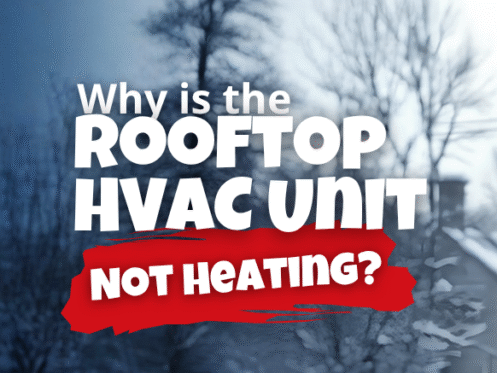leave employees and customers uncomfortable. Understanding the most common causes helps you address the problem quickly. Sam’s Air Control provides commercial HVAC services across New Jersey to get your rooftop HVAC system back on track.
Common Reasons Your Rooftop HVAC Unit Is Not Heating
Rooftop HVAC systems are packaged units that combine heating, cooling, and ventilation in a single cabinet mounted on the building’s roof. While these systems work hard to keep commercial spaces comfortable, several factors can prevent them from delivering adequate heat.
Thermostat or control failure
Your thermostat acts as the command center for your heating system. If it’s not sending the right signals, your rooftop unit won’t know when to fire up. Sometimes, the issue is as simple as incorrect settings, like accidentally switching it to cooling mode.
Control boards can also malfunction, especially in older units. They manage everything from ignition sequences to blower speeds. If you’re dealing with other rooftop HVAC problems, a faulty thermostat or control board may be the culprit.
Ignition or pilot issues
Gas-fired rooftop units rely on a functioning ignition system to generate heat. Modern units typically use electronic ignition systems, while older models may still have pilot lights. When these components fail, your unit won’t be able to ignite the burners, which means no heat.
Dirt buildup on the igniter, a cracked hot surface igniter, or a faulty flame sensor can all prevent proper ignition. If you have an older system with a pilot light, it might have blown out due to wind or drafts, or the thermocouple could have failed.
Dirty filters or blocked airflow
Air filters trap dust, debris, and other particles before they can enter your HVAC system. Over time, these filters become clogged, restricting airflow and forcing your system to work harder. When airflow is severely restricted, your rooftop HVAC heater may not work properly, even if it’s technically running.
Debris can accumulate around the unit, particularly on rooftops, where leaves, trash, and other materials often accumulate. Snow and ice buildup during New Jersey’s winter months can also block vents and exhaust ports.
Faulty blower motor or fan belt
The blower motor moves heated air through the ductwork and into the building. If this motor fails or runs inefficiently, warm air won’t reach where it needs to go. You might hear grinding, squealing, or rattling, which can indicate bearing problems or motor issues.
Fan belts connect the motor to the blower fan. These belts wear out over time, becoming loose, cracked, or broken. A broken belt means the blower won’t spin at all, while a loose belt can cause the blower to run inefficiently.
Refrigerant or heat pump component issues
Heat pump systems are a popular choice in many commercial HVAC applications due to their efficiency. They move heat rather than generating it through combustion. Heat pump systems rely on refrigerants to transfer heat from outside air into your building.
Low refrigerant levels, usually caused by leaks, can dramatically reduce heating capacity or prevent heating altogether. A failed reversing valve may cause your system to get stuck in cooling mode or stop operating altogether.
Electrical or sensor malfunctions
Rooftop HVAC systems contain many electrical components and sensors that must work together seamlessly. Limit switches monitor temperatures at various points in the system and shut down if temperatures get too high or too low.
Pressure switches monitor airflow and ensure safe operation. Loose wiring, corroded connections, and tripped breakers can prevent your system from heating properly. Electrical problems require professional diagnosis using proper testing equipment.
Weather-related damage
Rooftop HVAC units are exposed daily to rain, snow, wind, and temperature extremes. Ice can form on coils during cold weather, blocking airflow and preventing proper operation. Strong winds may damage fins on the condenser coil or even dislodge components. Moisture can infiltrate electrical components, causing shorts or corrosion.
While rooftop units are built to withstand weather, years of exposure take their toll. Woodbridge experiences hot summers and cold winters, so weather-related wear compounds quickly.
Quick Troubleshooting Steps
If you find your rooftop HVAC heater isn’t working, these simple troubleshooting tips might resolve minor issues.
Check your thermostat
Verify that your thermostat is set to heat mode and the temperature is set higher than the current room temperature. Look for any error messages, make sure the system is powered on, and check for tripped circuit breakers at your electrical panel.
Inspect air filters
Look at your air filters if they’re easily accessible. If they appear dirty or clogged, replacing them might solve your heating problem. Clean filters allow proper airflow, which is necessary for effective heating and system efficiency.
Clear debris around the unit
Examine the unit itself if you can safely access your roof. Remove any obvious debris around the unit, but don’t remove any covers or panels. Make sure vents and exhaust ports aren’t blocked by ice or other obstructions.
Try a system reset
Reset your rooftop HVAC unit by turning it off at the thermostat, waiting five minutes, then turning it back on. This simple step often clears minor electronic glitches. If these basic steps don’t resolve the issue, it’s time to call in the professionals.
When To Schedule a Professional Rooftop HVAC Inspection
Some heating problems require immediate professional attention. Call us for help if you notice:
- Gas odors near your rooftop unit
- Burning smells or visible smoke
- Unusual noises, like banging, grinding, or screeching
Even if your system seems to be working, regular maintenance is worth the investment. A proactive commercial HVAC system tune-up saves money in the long run by preventing emergency repairs and extending equipment life. Most manufacturers recommend professional maintenance at least twice a year, once before heating season and once before cooling season.
Systems approaching or exceeding 10 to 15 years may be candidates for replacement. For qualified small businesses, the Small Business Direct Install (SBDI) program can help make energy-efficient upgrades more affordable, covering up to 80% of project costs and offering 0% APR financing through the NJ Clean Energy program.
Get Your Commercial Heating Back On Track With Sam’s Air Control
Don’t let a rooftop HVAC unit not heating properly disrupt your business operations. At Sam’s Air Control, we’ve been providing reliable commercial HVAC services to Edison, Metuchen, and surrounding New Jersey communities since 2014.
Whether you need emergency repairs or want to set up a preventative maintenance schedule, we’re here to help. Our 24/7 emergency service means we’re available whenever you need us most. Contact us today to schedule your rooftop HVAC inspection and get your heating system working properly again.
Frequently Asked Questions
Why is my rooftop unit blowing cold air instead of heat?
Your rooftop HVAC might be blowing cold air due to a faulty thermostat, a stuck reversing valve (in heat pump systems), or a defective heating element or burner. A professional diagnosis is needed to identify the specific failed component.
Can a rooftop HVAC unit freeze in winter?
Yes, rooftop units can accumulate ice buildup during winter, particularly when there’s insufficient airflow. While some frost is normal during defrost cycles, excessive ice could point toward low refrigerant or drainage issues.
What’s the average lifespan of a rooftop HVAC system?
With proper maintenance, rooftop HVAC units typically last 10 to 15 years. If your system is over 10 years old and requires frequent repairs, replacement might be more cost-effective. Newer systems offer significantly better energy efficiency, which can offset replacement costs through lower utility bills.


